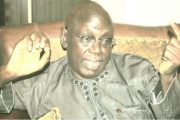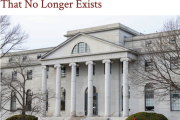There are many deciding factors that inform or influence whether states or entities should come together as a federation. Mutually shared borders, for one, enables them to come together to enlarge their territories and also remove all artificial barriers and impediments by their consent and in the process, become fused into one larger community. The elimination of borders meant also the removal of such barriers as customs and excise imposts, immigration check points, etc. The need for mutual protection and adoption of a common defense and foreign policy is also another impulse that drives entities towards coming together as a federal unit.
The persistence of local grievances and jealousies as they seem so overwhelmingly present in Nigeria today, and driven so inexorably by elite greed, competition and general irresponsibility, are the undoing of any federal system. The harmonization and removal of such sentiments are, therefore, the most important tasks or goals of any federal system. The Nigerian masses particularly the working classes and the rest of the enlightened segment of the country must assume this task seriously as a historical duty imposed upon them by their destiny and class posture. The active participation of the organised labour movement in Nigeria as evidenced by the convening of the “Colloquium” in 2017, suggests to us that the NLC was right in directing the debate on restructuring toward a rational and constructive target of national unity.

Before now, Prof Eghosa Osaghae, the expert’s expert on federalism would say that “A region centered federal trajectory won’t help us a country, we need to have a nation centered trajectory”. It has to be confirmed now if he still stands by that in the wake of contentious conceptions of federalism in Nigeria
Noting the advantages of the federal system of government, Mr. Buchan wrote “The parts are maintained in full national existence, but in so far as their interests transcend their own boundaries they are united in one larger state”. The federal system allows for the growth and expansion of the entity, and adaptability as to changing circumstances. The laws in a federation can be so crafted as to meet the peculiar needs of each unit, as well as accommodate the interests and concerns of the remaining entities. The uniformity of policies and regulations in a federal system would best be addressed and ensured under one executive, for reasons of efficacy and logical dispensation of justice and exigencies of administration.
The notion or principle of separation of powers is a characteristic of a federal system, and one of its best attributes. It is meant to ameliorate and harmonize the riot of ideas and conflicting policies across different jurisdictions and competences, and introduce sanity and harmony into all matters of the judiciary, the legislature and the federal executive administration. The central government would serve as the clearing house or collection center for decision-making on all national and international issues. Matters of local import or significance will naturally devolve on the different states or regions forming the constituent parts of the federation, to decide according to their peculiar needs and challenges. In this way, all distortions and constrictions would be removed and the process of administration and overall governance would become smoother and more facile.
Administration could thus proceed separately or collectively within each unit or across all the constituent parts, depending on what their peculiar needs are, or what the subject is all about. Issues common to some or all the parts of the federation can be a stimulus to their coming together under this system of government. The strongest argument in favour of federalism in Nigeria is the fact that all the federating units were created and then brought together by the British under a single imperial government and a common flag. For sixty years the Southern and Northern Protectorates were administered as unified entities, and under one federal system called Nigeria. The amalgamation of the two Protectorates took place in 1914; and since then they have lived together as one federal entity. Until 1966, the federal parliament and the regional assemblies acted in tandem as befitting a federal arrangement, with each having its responsibilities and powers clearly delineated in a national constitution.
To understand the evolution of Nigeria’s federal system will require the study and appreciation of the development of the country’s constitutional history. Each constitution endeavoured to stress the paramountcy of the federal system, and provided various degrees of rights and prerogatives to the regions and states. The Amalgamation of 1914 had effectively sealed the fate of the two territories and rendered them a single entity with a single destiny to follow. Amenities and other interests such as common infrastructures like railways, airlines, shipping lines etc, facilitated the maintenance of a federal system of government, to enable all the component parts to partake and benefit from these services in one way or another.
The promotion of common interests and maintenance of services common to all the entities became the most convincing reason for preferring a federal system. The moral and social imperatives for federalism in Nigeria are fundamentally underscored by her diverse multi-religious and multi-ethnic configuration. The realization that the divergent and separate group interests are best served and protected under a federal representative government underscored the staying together of all the entities that now form the Federal Republic of Nigeria. For a country of Nigeria’s complexity and diversity, this can only be assured through a working federal system. Where grievances are seen to persist and inadequacies become apparent, the blame should not be laid at the foot of the system per se, but with the operators who are unable to rise to the demand of their offices and demonstrate an adequate understanding of its workings.
As there are no insuperable difficulties that would prevent the smooth and satisfactory working of the federal system in Nigeria, any argument for its termination should be seen as mere posturing or self-serving contention of disaffected elements bent on causing confusion all around. All the core grievances against the federal system as is operated in Nigeria today have to do with questions of competence and perfection of governance, and not a reversal of the federal arrangement. Issues such as devolution of powers, resource allocation, derivation and representation in government are all constitutional matters that can be thrashed out in debates and negotiations in the National Assembly, within the framework of the existing laws of the federation.
Federalism is characterized by the delegation of powers to the entities or tiers that form the government as such, the regional or state governments and the provincial or local governments have their own lists of “to-do-things” outlined clearly in the constitutive documents that form the basis of the federal arrangement. Matters such as defense, foreign affairs, customs and excise, immigration and naturalization, control of river routes and seaports, aviation, etc, are delegated to the central administration while all other residual matters are devolved upon the other units. In this way, division of labour so to speak, is achieved and separation of powers established between and among the different levels of the state administration.
The limited or quasi-federalism where the central government determined finances, defence and foreign affairs only, while the associating regions controlled their own affairs may not be feasible or recommended for Nigeria. It has been experimented before and it failed to address the peculiar complexities of governance in Nigerian. A more expansive and robust system of federalism therefore became necessary and indispensable. There are no insurmountable barriers towards the further strengthening of federalism in Nigeria even where there exist disgruntlements and confusions here and there. The greatest threats to federalism according Buchan, are “parochialism of a party and the accidental caprice of the state”.
 To guard against such unfortunate factors, adhering to rule of law and commitment to the constitution are the best guarantees against both happening thereby jeopardizing the federal arrangement. The way offices are conceived and the powers given to them are also critical to the success of a federal arrangement. The most important offices are broadly the executive, the legislature and the judiciary. Each has its delimited powers and jurisdictions and each exercises these powers under the broad tutelage of the national constitution. According to Buchan, “The rock on which many federal enterprises have split is the election of the supreme head, and in most systems it is the weakest point.”
To guard against such unfortunate factors, adhering to rule of law and commitment to the constitution are the best guarantees against both happening thereby jeopardizing the federal arrangement. The way offices are conceived and the powers given to them are also critical to the success of a federal arrangement. The most important offices are broadly the executive, the legislature and the judiciary. Each has its delimited powers and jurisdictions and each exercises these powers under the broad tutelage of the national constitution. According to Buchan, “The rock on which many federal enterprises have split is the election of the supreme head, and in most systems it is the weakest point.”
The executive’s powers are important in giving direction and focus to the entire federation. It is the focal point or pivot of the government of the federation, as such its integrity and soundness must be above suspicion especially from party interests and factional preferences. Likewise, the office of the executive reflects the moral substance of the federation, therefore, its preservation under all exigencies must be the primary duty of the uniting parts in the federation. The executive therefore, becomes the centripetal force rather than a centrifugal power in keeping the federal structure together in one piece. It is the belt buckle that keeps everything else in place and in order.
Powers that are devolved to the executive by the constitution may vary from country to country, and the various differing circumstances that admit the coming together of the federating units. But in most situations, they are clearly guided towards providing a united and purposeful lead on matters that affect all the constituent parts of the federation. Such matters as the defense of the country, internal affairs, foreign policy, taxation, ports and railways, immigration, prisons, federally enacted legislation, and a few other critical matters are usually left to the center to deal with, with certain caveats and restrictions as to the overall interests of the constituent parts.
Federalism does not destroy individual national, ethnic or religious identities as it is sometimes erroneously believed. Rather, federalism consolidates them and offers each the space to grow and develop at its own preferred pace and tempo under the larger canopy of the federal system. Arguably, economic matters more than most, prove the catalyst in the dissolution of federal systems. Variations in economic situations of the different units and their disparate rates of development, fueled by some disgruntlements here and there, will easily blow into uncontrollable controversy that is capable of derailing the federal system.
Control of resources in the different parts when allowed to become the subject of widespread disquiet, creates undue tension and prejudice, often based on selfish considerations rather than rational points of view. Excluding one or some units from access to the resources of another unit, creates distortions in perceptions and sentiments of attachment to the federal system. Among the centrifugal forces that seem to threaten Nigeria’s federal system today, the most obvious and the one that had played such destructive role in the country’s history is tribalism or ethnicity. This tendency towards exclusivity of one ethnic group and seeing itself threatened by others is a feeling shared by all the tribes without exception. It is an irrational sentiment that thrives on fear that is often fueled by parochial and even paranoid apprehension about other people’s supposed antagonism towards the seemingly aggrieved entity.
Since no single State in Nigeria can claim to be wholly made up of only one homogeneous tribe or ethnic group, it then becomes futile to transport such a sentiment on to the larger national stage, while seeking to downplay it at the State level. In this regard, even if the federal system is broken up, all that we will succeed in doing is fragmenting and multiplying this problem across the entire political spectrum in microcosm. Rather than becoming a centrifugal force, tribalism can actually be the opposite, a centripetal force that should unite all the entities under the canopy of one strong and vibrant federal system for each tribe’s protection and advancement of its interests.
If ultimately our federal system collapses, it would do so largely or wholly on account of economic factors and nothing more or less. The differences in economic development and disparities in welfare of the people in the various states will, if unregulated and when left unattended, ultimately be the undoing of our federal system. It will breed deep seated jealousies and discontent, and while those that have more resources would begrudge those that have less and withhold sharing any with them. In the same vein, those that have less will look enviously at those who have more, and in the end irresistible pressures will build from both sides for the dissolution of the seemingly inequitable federal set-up so as to allow each to follow its supposedly destined path.
As far as states, nations or countries are concerned, and as far as history is the judge and instructor, there are no “destined paths” as such. It is only what the citizens through their wisdom or folly have decided to enact and pursue, will result ultimately as the befitting fate of the nation, which upon any rational inquiry, has nothing to do with destiny. Nigerians should be discerning and critical in making choices or in allowing themselves to be persuaded or guided by others, in determining how they should live with one another, and what system of government should best suit their purposes. This should be uppermost in their minds when they are told what to do in the sort of politics that we practice today, which elevates sentiment over reason, the rich over the poor, and the vociferous overt the reticent.


























